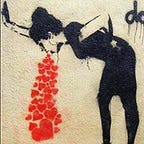Saving Anna Karenina
Part 10
Start with Part 1, and read a short synopsis of the the original book.
ANNA APPRECIATED MARGARET. She asked Anna about her day, about the good things she had seen and done. She didn’t try to upset her by asking about the things Jean wanted Anna to do. Things that were beneath her station, or simply bizarre. Why should she go to school? Anna knew how to read and write. What she should do was hire servants, but she hadn’t bothered to recruit any. Ever since she started taking the pills, she had little motive to do anything outside her room. It was a wonder just to lie and think.
Margaret didn’t hassle Anna about refusing to take the underground train, and when Seryozha needed a school, Margaret found him a small Russian school associated with a Russian church. When Anna fretted, Margaret agreed that whatever it was that was causing the worry was terrible. Mostly, she told Anna that Vronsky was terrible. This made Anna feel better. Sometimes Margaret would sigh when she answered the phone.
“Oh, hi Anna.”
But she didn’t embarrass Anna for staying home all the time. If she did anything out on the street, made a transaction with a trader, spoke to stranger or just paid note to the architecture, Margaret rewarded her with cooing and praise that encouraged Anna to try more outings.
She took Anna shopping at a store called Century. This store sold mostly utility clothes, for peasants and the middle people, like Margaret and Jean. These were fine for Seryozha, who wanted to dress like the boys in their neighborhood. But Anna burst into tears at the sight of one more pair of straight black trousers for women. She felt so tired of being mismatched with options that weren’t appropriate for her, and being misunderstood by nearly everyone for having higher tastes and expectations. Margaret summoned a merchant for help. It was an enormous store of four floors. This young lady showed Anna a section where clothes were more her style; some had fur on them, others sequins, and certain blouses were completely transparent. Margaret warned that these clothes were expensive. But all of them were feminine and soft, made of silks and other fine fabrics. Anna tried a gauzy black dress with long arms and a peacock feather printed on the front, going all the way from the ankles to the neck. Margaret clapped when she came out of the dressing room.
There was a section of the store with many different furs. Margaret became very nervous when Anna announced her intention to buy one of the coats here. She balled up her hands into fists and raised her shoulders and closed her eyes and took a deep breath that puffed out her chest in its red wool coat.
“Ooooooooooh”
“Are you hurt, dear Margaret?” Anna asked.
“Noooooo,” she said, exhaling. “It’s just that, in this day and age, fur, we, don’t, do, it. If Jean knew— ”
“But I’ve seen many ladies wearing fur coats!” said Anna, laughing.
“Of course. Of course. They do. But they’re…oh, whatever, Anna, you do what you want. Go ahead. Buy a mink coat!” Margaret exhaled again, dramatically.
ARA GARABEDIAN HAD KNOWN THE GOLD TRADER and the jewel buyer. They were all Transcaucasians; Margaret called them “Armenian.”
They waited for the gold trader to return from his office in a large garment warehouse near Ara Garabedian’s apartment.
“The Turks committed a genocide against Armenians in the beginning of the 20th century,” Margaret whispered.
“Oh!” Anna whispered. “And they’ve been fighting in Serbia just now.”
“Ara’s grandfather’s arms and legs were chopped off and he was thrown in a canal to drown,” Margaret said. “His mother took the children into Syria, Aleppo. They all survived, Ara’s mother and three uncles. She didn’t move to the States until she was in her 20s, and then she earned a scholarship to study flute at Rutgers. Oh, you should have heard her play! Glorious.”
The gold merchant returned with a thin solicitous smile. He seemed to Anna weary and a little martyred. Why should he be doing Anna this kindness?
He smoothed out a short stub of paper on a glass countertop. “A check will do?”
“Oh, yes, thank you so much, Berge,” said Margaret.
Anna nodded. Berge wrote on the check, a promise to the bank, apparently, and handed it to Anna ceremoniously. It was for $20,000.
“There you go, my dear,” he said. “I hope this provides you with a means to establish yourself here. It is not an easy place. I was born here, but I still brace myself before I take the train into work each morning. You might find you’d rather live in a calmer place, I live in New Jersey. If you’d like, I can speak to my wife and we can invite you over to dinner one night, give you a tour.”
“It would be my pleasure,” said Anna. Margaret smiled proudly, her long red lips pushing her cheeks out. She put her hand on Anna’s back and rubbed. At first Anna shrunk at the affection, but then she felt herself shifting, drawing closer towards Margaret’s touch. The sensation produced both embarrassment and need. On the one hand some childish part of her wanted to be caressed by a sexless companion, and another part was too proud and adult to tolerate this primary impulse. And then she leaned toward Margaret, almost dropping her head on her shoulder, feeling an urge to drop all of her weight on her like a sack of potatoes.
